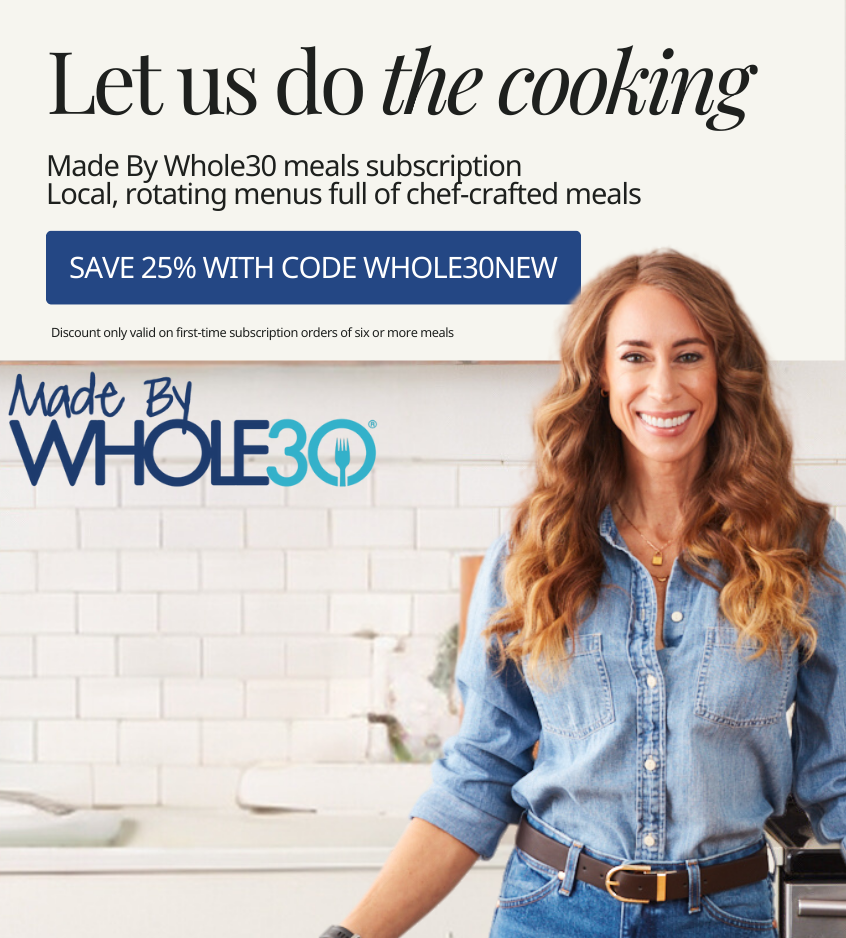Our new “Talk to your Doc” articles will feature a series of guest posts written by medical professionals. Our goal is to help prepare you to discuss issues related to the Whole30, your medical condition, and your general health concerns with your doctor. Today’s article was written by Luc Readinger, M.D. (You may recognize the name – Dr. Readinger also wrote the foreword for It Starts With Food!)
Dog-eared copy of It Starts With Food in hand, you make your way to your physician’s office to seek counsel before beginning your Whole30. Feeling slightly nervous, you’re ready to solicit your physician’s support in making revolutionary lifestyle changes to improve your health. You explain briefly what you want to do, and your physician looks at you and says… “No.”
If your doctor is not willing to support you in this journey towards improving your health, where do you go from here?
While the above scenario is hypothetical, not all physicians believe in the health benefits of a Paleo diet or a Whole30 program. Whether you are approaching your doctor to manage their medications during a Whole30, or simply want to lose weight, improve health markers, and feel better, today we’ll discuss the best way to approach your physician or health professional to increase your chances of forming a successful health partnership, and how to counter some common objections and misperceptions they may have about this way of eating.
Your physician is presumably doing the best job he or she can. That job is not only to make you better when you are sick, but to prevent illness from occurring to the full extent of his or her knowledge, skills, and training. There may be any number of reasons why a physician may perceive a Paleo diet or Whole30 program as harmful. Maybe you have elevated cholesterol and your doctor is worried that increased meat consumption will give you heart disease. Maybe you have osteoporosis and the concern is that without dairy products, your bones will turn to dust in your body while you are still alive.
Regardless, your mission is to create a health partnership between you and your doctor. After all, you share a common goal—making you as healthy as you can be! So let’s start with a good opening line.
Creating a Health Partnership
A non-threatening approach may go something like this: Take a copy of the Whole30 program with you to give to your physician. You could say something like:
“I’ve decided that I want to improve my health. I’d like to have more energy, lose weight, and lower my blood pressure. (State your reasons for doing the Whole30.) I have a whole foods-based dietary self-experiment that I’m going to try for the next 30 days.” If applicable, add, “I’m concerned that some of the medications I take may need to be adjusted. Before I start, I’d like to review my meds with you and see if anything needs to be changed.”
Give a copy of the Whole30 to your physician. Don’t expect him or her to read it on the spot, but be ready to explain it in 20 seconds or less.
“I want to switch to a whole foods diet, eliminating processed food and junk food. I’ll be eating meat, seafood, and eggs, lots of vegetables and fruits, and healthy fats like olive oil and avocado. I’ll be cutting out things like bread, pasta, and baked goods; dairy; soy and other beans; added sugar; alcohol; and junk food for 30 days.”
Why will this approach work? Physicians like to hold on to the viewpoints they’ve developed in their years of professional training. Plus, they get into medicine with some sense of wanting to help people. By making the request in a manner that is not challenging medical authority and appeals for their help, your doctor will more likely want to work with you. It’s possible that, at this point, your doctor will agree to your plan, and work with you to ensure your Whole30 is safe and healthy for your medical condition. However, there’s a good chance you’ll be met by some objections at this point. Let’s talk about how to prepare for those.
Common Objections: Cholesterol
The evidence for blood cholesterol levels and their role in heart disease has been called into question over the past few years. If your doctor objects to you doing the Whole30 on the basis of ingesting too much cholesterol, you can provide reassurance that it’s not all eggs and fatty red meat—you’ll be consuming plenty of fruits and vegetables as well. This is a great opportunity for you to correct one misconception of a Whole30 approach—it’s not carnivorous, and the protein portions are quite moderate. (If you’re feeling science-y, you can also mention that cholesterol itself isn’t bad—it’s the precursor for steroid hormones including testosterone, estrogen, progesterone, glucocorticoids, and mineralocorticoids! Do your homework starting on page 147 of It Starts With Food.)
Although you could get into a heated debate and cite various studies from the medical literature, “A man convinced against his will is of the same opinion still.” Remember, you’re not there to win, you’re there to get help. You can gently remind your physician that this is just for a 30 day period. Even Morgan Spurlock eventually recovered from his 30 day “Super-Sized” diet.
Common Objections: Calcium
Another concern your physician may have is not having dairy in your diet. It has been burned into the public conscious that the only way to get calcium is through dairy (especially milk), and if you aren’t drinking some every day, your bones will get mushy.
While calcium is important in the diet, significant amounts are found in kelp, leafy greens, brazil nuts, broccoli, dried figs, bone broths, and many other non-dairy foods. Promise to include lots of these foods in your diet over the course of your Whole30 and you should be good to go.
Common Objections: Carbs and Fiber
Lack of carbohydrates and whole grains might be another concern. Your brain can run just fine (and some would argue better) without these. However, while the Whole30 tends to be lower in carbohydrates than a Standard American Diet, reassure your doctor that the Whole30 is not a carb-restricted plan. Nowhere does it say to consume less than X number of carbs per day. The plan encourages fruit (especially in the summer) and starchy vegetables like sweet potatoes.
If fiber is a concern, well… with all of the fruits and vegetables you’ll be consuming, it shouldn’t be. Reassure your doctor that the plant matter you’ll be consuming will provide all of the necessary dietary fiber to keep you healthy.
A Couple of Things Not to Do
Don’t ask for permission. What you put into your mouth and how you feed your body is your responsibility. Unless you you are truly seeking your physician’s advice on the most appropriate diet for you (which is fine), don’t ask if it is “okay” to try the Whole30. This sets you up to be easily rejected. If Paleo is a foreign notion to your physician and is perceived as possibly dangerous or questionable, he or she will likely want to be on record as saying no and recommending a different, more conventionally-accepted way of eating.
Don’t try to convince. Don’t go in with a vision of turning around your physician’s opinions on diet and nutrition. There are years of cultural and educational forces that shaped that opinion to what it is today. A few minutes of Paleo proselytizing are a mere drop in the ocean and have a slim chance of changing a mind that is not ready to change. You can argue with your physician all you want about the merits of this way of eating, but it will be counterproductive if your goal is to elicit help in overseeing your health care during your Whole30.
Find a new doctor. If you still can’t get your physician on board, maybe it’s time to find someone who will be more supportive of you in your quest to become healthier. Do you really want to grow older with someone caring for your medical needs who won’t help you try to live a healthier life?
Re-Find Health is a fantastic way to connect with a like-minded health care professional in your area. I hope these tips will help you feel more confident talking to your doctor about taking on the Whole30. Good luck, and may you look good, feel good, and have a long and healthy life.
This site does not provide medical advice, diagnosis, or treatment. The information presented here is general information for educational purposes only, and is not a substitute for medical care. You should not use the information in place of a visit, consultation, or the advice of your physician or healthcare provider. If you believe you have a health problem or if you have any questions regarding your health or a medical condition, you should promptly consult your physician or healthcare provider. Never disregard medical or professional advice, or delay seeking it, because of something you read on this site. Seek the advice of a medical professional before embarking on any diet or lifestyle modification.















